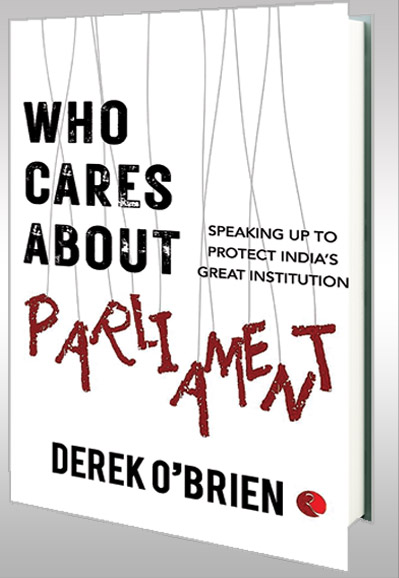By rampant disinvestment in PSUs, the government is abdicating its social responsibilities. An extract
Derek O’Brien
 Here’s a sampling of what was/is on offer at the Union government’s ‘Great Indian Sell-off’.
Here’s a sampling of what was/is on offer at the Union government’s ‘Great Indian Sell-off’.
Air India
The government has sold 100 per cent stakes in Air India, along with a 100 per cent stake in the low-fare Air India Express and a 50 per cent holding in the ground-handling company Air India SATS Airport Services Private Limited or AISATS. Before its privatization, Air India and Air India Express together had a 12 per cent domestic market share and 43 per cent of the international market in India. The two companies serve 54 domestic cities and 43 international destinations.
Indian Railways
The Union government keeps denying that the Railways are being privatized. And yet we hear the Ministry or Railways announce that 151 trains on 109 pairs of routes will be operated by the private sector. The private sector will invest Rs 30,000 crore. Only the driver and guard (now redesignated as train manager) will be railways employes; all other will be on the rolls of the private operators of these trains. These private players will be free to procure trains and locomotives from any source of their choice. Who should one believe?
The Indian Railways is driven by a social obligation to provide basic transport facilities to people, and it provides a lifeline to several small and medium scale economic activities. Privatizing the Railways means privatizing the profit-making parts of the Railways and burdening the public sector with increased losses.
Ordnance Factories
The government has decided to corporatize the 41 ordnance factories across India into seven 100 per cent government-owned corporate entities, registered under the Companies Act 2013. Seventy-six thousand workers working in the various ordnance factories had written a strong note opposing the corporatization of ordnance factories.
There is justifiable apprehension that this is the thin end of the wedge and will be followed, in due course, by the sale of these seven companies to private and foreign buyers. Should the government be relinquishing control over such strategically critical assets? Shouldn’t there be, at the very least, a vigorous public debate over this? In keeping with its past practice, the Union government has chosen to brazenly ignore these legitimate concerns.
Shopping Corporation of India
The Union cabinet has given an ‘in-principle’ approval for the strategic divestment of Shipping Corporation of India (SCI) and Container Corporation of India Ltd (CONCOR). The Department on Investment and Public Asset Management invited Expression of Interest for strategic disinvestment of its entire stake of 64 per cent in SCI, along with the transfer of management. Again, the government is handing over control of what is a strategically important asset to the private sector without so much as a public consultation.
General Insurance Companies
The government has passed the General Insurance Business (Nationalisation) Amendment Bill, 2021. The Bill allows for privatization of public-sector insurance companies. There are reports that the government will sell United India Insurance Company Limited, one of the four public-sector general insurers, to private and/ or foreign players. This could be followed by the privatization of one or more of the remaining three. This move will impact crores of retail customers and thousands of people employed by these organizations. In 2022, the government sold 3.5 per cent of its stake in LIC and raised Rs 21,000 crore.
No More Masters of Their Destiny
The phrase ‘selling the family silver’ is taking on a whole new sinister meaning. Other than being an economically unwise decision, the move to hastily privatize the PSUs is also socially unjust. They have historically played an active role in developing backward regions. Importantly, through reservations, the PSUs have ensured high-quality jobs for Dalits, adivasis and Other Backward Classes. Once the PSUs are privatized, or after the government’s stake falls below 50 per cent, reservations for these historically marginalized sections will become history.
Further, the government needs to work on a mechanism to make employees, partners and stakeholders in decisions like strategic sale of PSUs. Going forward, dealing with the employees of the PSUs being sold will emerge as the biggest challenge for the government.
The Union government has presided over an exponential rise in non-performing assets (NPAs). Gross NPAs, under its watch between 2015 and 2020, were nearly 365 per cent higher than in the last six years of the United Progressive Alliance, i.e., 2008-14. Unable to fix the NPA crisis, the government wants to privatize public-sector banks. India’s experience with Yes Bank and other private-sector hardly inspires confidence that privatization will eliminate greed and corruption in banking.
Many of our PSUs and public-sector banks are profitable institutions that facilitate crucial developmental outcomes. Others require a realignment of incentives or an infusion of capital to affect a profitable turnaround. To derive maximum value from the PSUs for the exchequer, the government should calibrate an appropriate strategy for each individual company. That requires careful, detailed effort and a commitment to the government’s role as trustee of the nation’s assets. Abdicating that responsibility, the Union government is choosing to sell the PSUs and public-sector banks wholesale for short-term gains. This is wrong and the long-term loss of public wealth cannot be justified.
The public sector was created by the Government of India to make a self-sufficient nation and to become ‘the master of our own destiny’. Dismantling it will most definitely not help us achieve that goal.
WHO CARES ABOUT PARLIAMENT: SPEAKING UP TO PROTECT INDIA’S GREAT INSTITUTION
Derek O’Brien
Rupa Publications India, Pg 224, Rs 395

